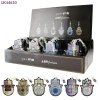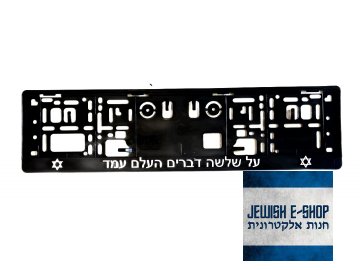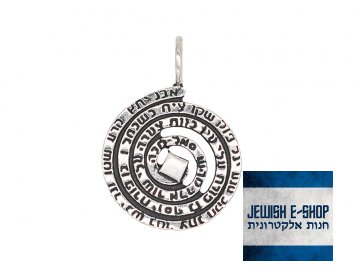Prayers and blessings
Bestsellers

"Sh'ma Yisrael Adonai Eloheinu Adonai Eḥad:" Rising font on the wrist band!
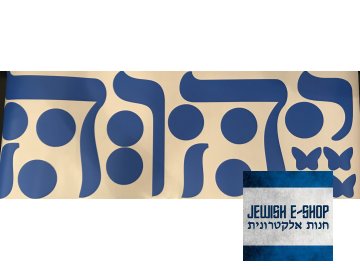
"Encrypted" name with the dots, because only the high priest in the Temple could really say it on Yom Kippur.
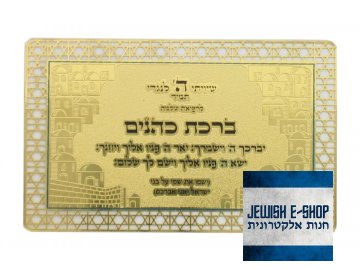
In a gold design, with a relief of Jerusalem, framed by the stars of David and with the head of the table Shiviti.The second (grey) table of Shiviti is written black and yellow...
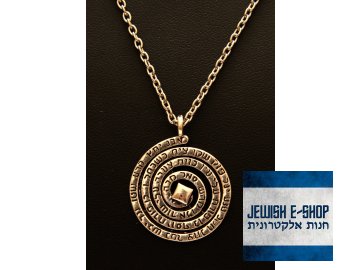
Ben Porat with "Ana be-Khoah" prayer and a combination of angel's names: LD, MHS, SAL and MBH and it means: Ana, lamadni datecha / Me-olam hu shemecha / Seter at li /...
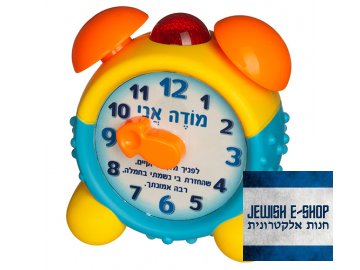
The perfect tool for children - an alarm clock that recites the "Modeh Ani" prayer when pressed. Variant for boys, blue numbers and letters. Plastic, 10 cm. Modeh Ani is a...
What is prayer?
Everyone can imagine something under this term. But let's go back to the beginning. When the Israelites wandered in the wilderness, back in the time of Moses, there were no prayers. That all came with the Torah. When the first temple was built in Jerusalem under King Solomon, the singing of psalms was introduced, and so began the tradition of prayer. The rabbis came and the prayers grew and grew. Today, they are written in the Jewish prayer book siddur. It is found in every synagogue (temple) and in most homes. It contains 150 biblical psalms, historical passages, ancient hymns and liturgical meditations from the Five Books of Moses.
Why pray?
The obligation to pray is stated in the Torah and applies to both men and women. Prayer is meant to express one's love for God. Prayer is seen as a kind of exercise in discipline, an effort to re-establish a union with God. There is a difference between private and communal prayer. If one prays in a synagogue or yeshiva, for example, the prayer is in Hebrew. But if we pray alone at home, perhaps at bedtime, it is up to us what language we choose.
How often to pray?
Here we can find exceptions. While the obligation of men is to pray at least 3 times a day, for women it is stated once a day. All Jewish holidays begin in the evening, and so the first prayer of the day is the evening one. This is followed by morning and afternoon prayer. According to tradition, Abraham instituted the first morning prayer, Isaac the afternoon prayer, and Jacob the evening prayer. On the Sabbath or at the time of the High Holidays, the number of prayers varies, of course. There are more prayers and more rules. Each holiday has its own specifics, but in general, the most common rituals associated with prayer take place every day.
What does it look like?
Many are often struck by how the praying men are dressed. Yes, men. In fact, clothing in prayer is especially crucial for them. Many halachic regulations do not apply to women or are not required to be practiced by them. It is different for men. Head covering is a must. Whether it is a hat, cap or kippah (yarmulke). A prayer shawl (tallit) is also part of the garment, and during morning prayers and on weekdays men wear tefillin. Prayer straps with a black box containing a scroll containing a verse from the Torah. The straps are fastened in a special way on the forearm and on the head. And that famous swaying? Rabbis still disagree about that. Some argue that the ecstatic rocking back and forth during prayer is out of place. Others even encourage such displays. I guess it depends on how much one can take.
Blessings
Something as natural as breathing. For example, the Bible nowhere mentions when the blessing should be said, it was simply common knowledge and did not need to be written down. It was blessed in the sanctuary at the end of the service. It was blessed in the past, it is blessed today, and it will be blessed hundreds of years from now.
When is it blessed?
There are many times in the life of a practicing Jew when it is appropriate to say a blessing. One of the great chapters, for example, is dining. Blessings are said over food and drink, blessings are said at the time of holidays or even at the fastening of the mezuzah. Blessings are said when it rains or when the sun comes out. When we put on new clothes, when we hear good news, or even when we get a really good night's sleep.



